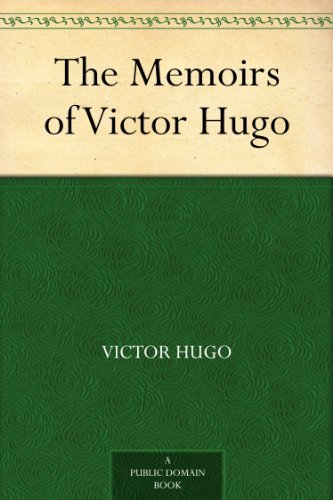Newly released
This book is new and will be uploaded as soon as it becomes available to us and if we secure the necessary publishing rights.

The Memoirs of Victor Hugo Book PDF
(0)
Author:
Victor HugoNumber Of Reads:
179
Language:
English
Category:
HistorySection:
Pages:
332
Quality:
excellent
Views:
1233
Quate
Review
Save
Share
Book Description
Victor-Marie Hugo (1802-1885) was a French poet, playwright, novelist, essayist, visual artist, statesman, human rights campaigner, and perhaps the most influential exponent of the Romantic movement in France. In France, Hugo's literary reputation rests primarily on his poetic and dramatic output and only secondarily on his novels. Among many volumes of poetry, Les Contemplations and La Légende des Siècles stand particularly high in critical esteem, and Hugo is sometimes identified as the greatest French poet. In the Englishspeaking world his best-known works are often the novels Les Misérables and Notre-Dame de Paris (translated into English as The Hunchback of Notre-Dame) (1899). Though extremely conservative in his youth, Hugo moved to the political left as the decades passed; he became a passionate supporter of republicanism, and his work touches upon most of the political and social issues and artistic trends of his time. He is buried in the Panthéon. Amongst his other works are: Napoleon the Little (1852), The Man Who Laughs (1869), The History of a Crime (1877), Poems (1888) and The Memoirs of Victor Hugo.
Victor Hugo
Victor Hugo was a renowned French author, poet, and dramatist of the 19th century, widely regarded as one of the greatest literary figures in French history. Born on February 26, 1802, in Besançon, France, Hugo began his literary career as a poet, publishing his first collection of poetry at the age of 20.
Hugo's childhood was marked by personal tragedy, including the death of his father when he was just 11 years old, and the deaths of his daughter and two of his sons later in life. These experiences are thought to have influenced his work, which often explores themes of loss, love, and human suffering. His writing was also heavily influenced by the political and social upheavals of his time, including the French Revolution and the rise of Napoleon Bonaparte.
Hugo was a prolific writer who produced a wide range of literary works throughout his career, including plays, essays, and political speeches. However, his most famous works are his novels, which often feature complex plots and a large cast of characters. "Les Misérables," for example, follows the story of ex-convict Jean Valjean as he struggles to rebuild his life in the midst of poverty and social injustice. The novel explores themes of love, redemption, and social inequality, and has been praised for its vivid descriptions of 19th-century France and its unforgettable characters.
In addition to his literary work, Hugo was also involved in politics, advocating for social justice and democratic reform throughout his career. He was a member of the French parliament for many years, and was a vocal opponent of the death penalty and other forms of injustice. He was also a leading figure in the Romantic movement, which emphasized emotion and individualism in art and literature.
Hugo's moral and political choices during the second half of his life and his unique actions made him an emblematic figure who was posthumously honored by the French Third Republic on May 22, 1885, with a popular funeral that accompanied the transfer of his body to the Cemetery in Paris on May 31, 1885.
Today, Hugo's works continue to be celebrated around the world for their depth, beauty, and enduring relevance. His novels have been translated into numerous languages, and his poetry is still widely read and admired. Hugo's legacy as one of France's greatest literary figures is secure, and his influence on French literature and culture can still be felt today.
Book Currently Unavailable
This book is currently unavailable for publication. We obtained it under a Creative Commons license, but the author or publisher has not granted permission to publish it.
Rate Now
5 Stars
4 Stars
3 Stars
2 Stars
1 Stars
The Memoirs of Victor Hugo Quotes
Top Rated
Latest
Quate
Be the first to leave a quote and earn 10 points
instead of 3
Comments
Be the first to leave a comment and earn 5 points
instead of 3